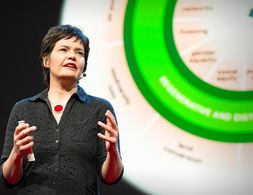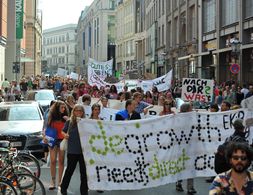✕
72 results
In the history of the social sciences, few individuals have exerted as much influence as has Jeremy Bentham. His attempt to become “the Newton of morals” has left a marked impression upon the methodology and form of analysis that social sciences like economics and political science have chosen as modus operandi.
This paper starts with an evaluation of three common arguments against pluralism in economics: (1) the claim that economics is already pluralist, (2) the argument that if there was the need for greater plurality, it would emerge on its own, and (3) the assertion that pluralism means ‘anything goes’ and is thus unscientific. Pluralist responses to all three arguments are summarized. The third argument is identified to relate to a greater challenge for pluralism: an epistemological trade-off between diversity and consensus that suggests moving from a discussion about ‘pros’ and ‘cons’ towards a discussion about the adequate degree of plurality. We instantiate the trade-off by showing how it originates from two main challenges: the need to derive adequate quality criteria for a pluralist economics, and the necessity to propose strategies that ensure the communication across different research programs. The paper concludes with some strategies to meet these challenges.
This course provides future change makers in public and private sectors with a comprehensive overview on the structures and actors that shape markets.
How did the coronavirus almost bring down the Global Financial System? What effects does monetary policy have on inequality? What role do Central Banks have in the social-ecological transformation? How could Central Banks tackle climate change? What is Central Bank Digital Currency?
Tetteh Hormeku-Ajei, member of the Post-Colonialisms Today Working Group, provides insight on the history of primary commodity export dependence in Africa, and relates it to the difficulties African governments are facing finding necessary resources to tackle the COVID-19 pandemic.
Austrian economics focuses on the economic coordination of individuals in a market economy. Austrian economics emphasises individualism, subjectivism, laissez-faire politics, uncertainty and the role of the entrepreneur, amongst others.
Aim of this intensive workshop is to understand macroeconomic workings of climate change as as the background of sustainable finance; to analyse financial assets with ESG (Environmental, Social and Governance) criteria attached to them and their markets and important institutional players; to develop a critical perspective on the current setup of sustainable finance; and to synthesise this knowledge by applying it on in-depth case studies.
After completing the module, participants should be able to analyse the concepts of degrowth, ecological unequal exchange, Green New Deal, and embeddedness by applying theories situated within the fields of academic research of Ecological Economics and Political Ecology.
This article outlines the fundamental challenges of democratically planned economies and categorises proposed models into six groups, each of which approaches planning and coordination at different levels of authority and between myriad economic units in a particular way, taking into account efficiency as well as democratic principles and environmental and social sustainability. Through a classification system based on decision-making authority and mediation mechanisms, the article provides a framework for understanding and comparing these models. By examining their different approaches, it offers insights into the complexities and potential paths of democratically planned economies in the 21st century.
This episode from Odd Lost podcast with financial analyst Zoltan Pozsar features a discussion on the potential long-term financial effects of the Ukraine-Crisis on dollar and the global currency system centered around it.
This lecture is based on the “Introducing the Economy” chapter from the Economy Studies book, which introduces the first building block in their framework for transforming the economics education. The aim is to give students a feel and
understanding of the economy as part of a bigger whole. Thus, it is aimed to introduce to students before getting into the economics curriculum with theory and models.
Taking as its starting point the interdependence of the economy and the natural environment, this book provides a comprehensive introduction to the emerging field of ecological economics.
Ecological economics explores new ways of thinking about how we manage our lives and our planet to achieve a sustainable, equitable, and prosperous future. Ecological economics extends and integrates the study and management of both "nature's household" and "humankind's household"—An Introduction to Ecological Economics, Second Edition, the first update and expansion of this classic text in 15 years, describes new approaches to achieving a sustainable and desirable human presence on Earth.
"Ecological economics is an exciting interdisciplinary field of study that combines insights from the natural sciences, economics, philosophy and other fields to develop innovative approaches to environmental problems.
Recovery from the Covid-19 crisis provides a chance to implement economic measures that are also beneficial from environmental and social perspectives. While ‘green’ recovery packages are crucial to support economies tracking a low-carbon transition in the short-term, green measures such as carbon pricing are also key to improving welfare in the long-term. This commentary specifies the need for carbon pricing, outlines its implications for our everyday lives, and explains how it works alongside value-based change in the context of climate action and societal well-being.
Dependency in Central and Eastern Europe - Self-reliance and the need to move beyond economic growth
In this essay, the author takes a critical perspective on the pursuit of growth as the solution for providing for environmental sustainability and economic stability in the countries of Central and Eastern Europe.
Drawing from the framework of dependency theory and presenting brief insights into European core-periphery relations the author then argues for the implementation of an alternative strategy to development that is built around the concept of self-reliance.
How can we establish new institutions and practices in order to use fare-free public transport as a beacon for sustainable mobility and a low-carbon lifestyle? The author of this essay elaborates on how practice theory and institutional economics can help to answer this question.
MERCOSUR (Mercado Común del Sur or Common Southern Market) was the first formalized attempt to integrate South American countries economically and politically.
In this Ted Talk, Oxford economist Kate Raworth argues that instead of prioritizing the growth of nations, the world should rather prioritize meeting the needs of all people living on the planet within ecological limits.
In this essay the author elaborates on the EU's perspective on the fast growing sector of the platform economy.
In this essay the authors argue for a wider concept of care work that includes community building, civic engagement and environmental activism. On the basis of the case of Cargonomia, a grassroot initiative in Budapest, they show that such a wider concept of care work could allow for different narratives that promote sustainable lifestyles with a milder environmental and social impact on the planet and its communities.
Adhering to the multiplicity of degrowth whilst also arguing that strategic prioritisation and coordination are key, Degrowth & Strategy advances the debate on strategy for social-ecological transformation. It explores what strategising means, identifies key directions for the degrowth movement, and scrutinises strategies in practice that aim to realise a degrowth society.
An essay of the writing workshop on contemporary issues in the field of Nigerian economics: In Nigeria, it appears that there is nothing in the constitution, which excludes the participation of women in politics. Yet, when it comes to actual practice, there is extensive discrimination. The under-representation of women in political participation gained root due to the patriarchal practice inherent in our society, much of which were obvious from pre-colonial era till date.
The novel coronavirus (Covid-19) is rapidly spreading around the world. The real economy is simultaneously hit by a supply shock and a demand shock by the spread of coronavirus. Such a twin shock is a rare phenomenon in recent economic history.
In this short podcast, Naomi Fowler, the Tax Justice Network's creative strategist, discusses how the laws made by those who profited from slavery and the empire and, the extractive business models of the major financial sector continue to impoverish some of the poorest nations.
An essay of the writing workshop on Nigeria’s Readiness for and the Effect of the Fourth Industrial Revolution
The article pursues the two related questions of how economists pretend to know and why they want to know at all. It is argued that both the economic form of knowledge and the motivation of knowing have undergone a fundamental change during the course of the 20th century. The knowledge of important contemporary economic textbooks has little in common with an objective, decidedly scientifically motivated knowledge. Rather, their contents and forms follow a productive end, aiming at the subjectivity of their readers.
Introduction Economics is by necessity a multi paradigmatic science Several theoretical structures exist side by side and each theory can never be more than a partial theory Rothschild 1999 Likening scientific work to the self coordinating invisible hand of the market Michael Polanyi cautioned strongly against centralized attempts to steer …
What made the false assumption that saving the economy at all cost during a pandemic so popular? This paper discusses different pathways through the COVID-19 pandemic at national and international level, and their consequences on the health of citizens and their economies.
This film looks at the role economic growth has had in bringing about this crisis, and explores alternatives to it, offering a vision of hope for the future and a better life for all within planetary boundaries.
Post-Keynesians focus on the analysis of capitalist economies, perceived as highly productive, but unstable and conflictive systems. Economic activity is determined by effective demand, which is typically insufficient to generate full employment and full utilisation of capacity.
Evolutionary economics focuses on economic change. Hence processes of change such as growth, innovation, structural and technological change, as well as economic development in general are analysed. Evolutionary economics often gives emphasis to populations and (sub-)systems.
We use cookies on our website. Click on Accept to help us to make Exploring Economics constantly better!






























